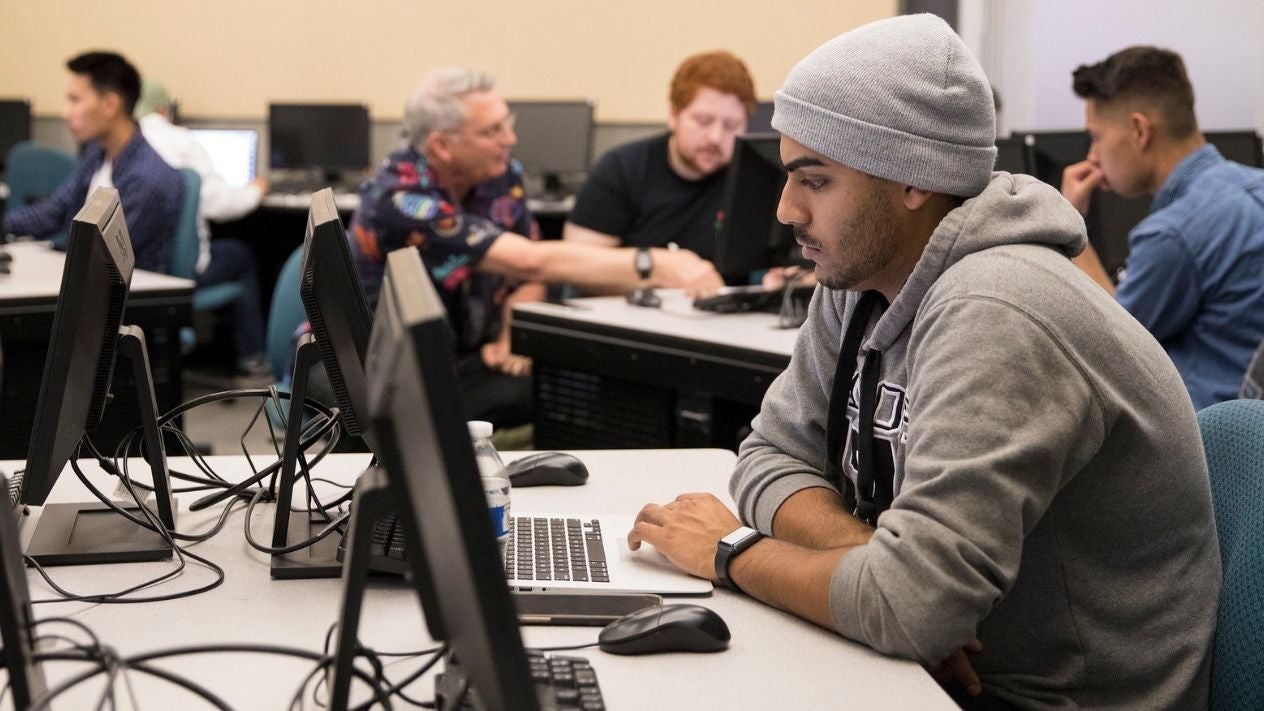Welcome to the Business, Computer Science & Culinary Arts Student Center. Visit us on campus or online to connect to peer tutors, counselors and support services.
Online Support
Access free, online support and tutoring in business and computer science.
Zoom Room
- Connect via Zoom.
- A host will pair you with the next available tutor. Please stay muted until your tutor is ready.
- Students may work with tutors for 15 minute sessions (and longer if time allows).
Canvas Support Hub
The DVC Support Hub in Canvas can connect you with online ed planning tools, technology help, health and wellness services, basic needs support, career and transfer services, student life and more! Log in with your InSite username and password to access services.
NetTutor
NetTutor is available nights and weekends.
On-Campus Support
Visit our collaborative work space on campus, where you can connect with peers, instructors and support staff in business and computer science. Here you'll find:
- computers
- wifi and charging stations
- small group and individual workspaces
- "Zoom Zones" - space to attend your online classes, with webcams and earbuds available
- peer tutors for drop-in academic support
- counselors for drop-in ed planning and/or personal concerns
- librarians for help with research and citations
Tutoring & Counseling Hours
Check back here often, as our online and on-campus hours are not always the same, and are subject to change.
-
Financial Accounting, Business Law & Business Statistics
Mon: 12:30 p.m. - 5 p.m.
Tues & Thurs: 3 p.m. - 5 p.m.
Wed: 12:30 p.m. - 4 p.m.
Fri: 10 a.m. - 2 p.m.C++, Python, Java and Assembly Tutoring
Mon & Thurs: 10 a.m. - 5 p.m.
Fri: 10 a.m. - 3 p.m. -
Financial Accounting, Business Law & Business Statistics
Mon: 12:30 p.m. - 5 p.m.
Tues & Thurs: 3 p.m. - 5 p.m.
Wed: 12:30 p.m. - 4 p.m.C++, Python, Java and Assembly Tutoring
Mon - Thurs: 10 p.m. - 5 p.m.
-
Business Counseling Drop-in Hours
Wed: 1 p.m. - 3 p.m.
Learn More
-
Why be a tutor?
- Tutoring is challenging, rewarding, and fun for both tutor and tutee.
- Tutoring is an excellent way for students to gain experience and insight, especially if you are considering teaching as a career.
- Tutoring experience is valuable for scholarship, college, and job applications as well as résumés.
- Tutoring is a useful tool to gain in-depth knowledge in a variety of subject matters.
- Tutoring gives you a rare opportunity to experience the dynamics of teamwork and thus contribute to the growth of the DVC campus community.
- Trained tutors are paid for their time tutoring.
- Employment as a tutor satisfies work-study and CalWORKs employment requirements.
How to qualify for a tutor position
- Must carry a GPA of 3.5 or better.
- Receive a written recommendation from the instructor of each class you want to tutor.
- Speak, write, and understand English fluently and clearly.
- Must be a full time DVC Student
- US residents must be enrolled in 6 units or more.
- International students must be enrolled in 12 units or more.
- Not exceed 20 hours a week in your total workload on the DVC campus.
- Be eligible to work on campus.
New tutors must have completed or currently be enrolled in one of the following in order to meet the training requirement to be eligible to tutor for the Business, Computer Science and Culinary Arts Student Center at DVC Pleasant Hill:
Business Accounting
- Completed BusAc 186
- Completed BusAc 187 (highly desired)
Computer Science
- Completed COMPSCI 110
- Completed COMPSCI 165
- Completed COMPSCI 210 (or have completed 200 and are currently enrolled in 210)
Thank you for your interest in becoming a DVC BC2 Tutor!
-
As a result of using tutoring services, students will:
- Feel more confident in their learning and knowledge;
- Have an increased appreciation for the subject;
- Have an increased level of engagement in the subject;
- Be prepared to transition to more advanced concepts;
- Exhibit behavior that promotes success including:
- Asking questions in class and of the instructor;
- Participating in peer discussion;
- Visiting professor in office hours;
- Participating more in class;
- Procrastinating less;
- Taking notes;
- Feeling comfortable with tutoring and asking for help;
- Feeling more connected to classroom learning.
- Exhibit greater academic endurance and independent learning including:
- Having a willingness to attempt difficult material again and again and again (perseverance);
- Understanding available resources and how to access them;
- Learning strategies to be better able to think critically and solve problems independently;
- Recognizing the need for and have an improved understanding of key concepts and fundamentals;
- Be more successful.
